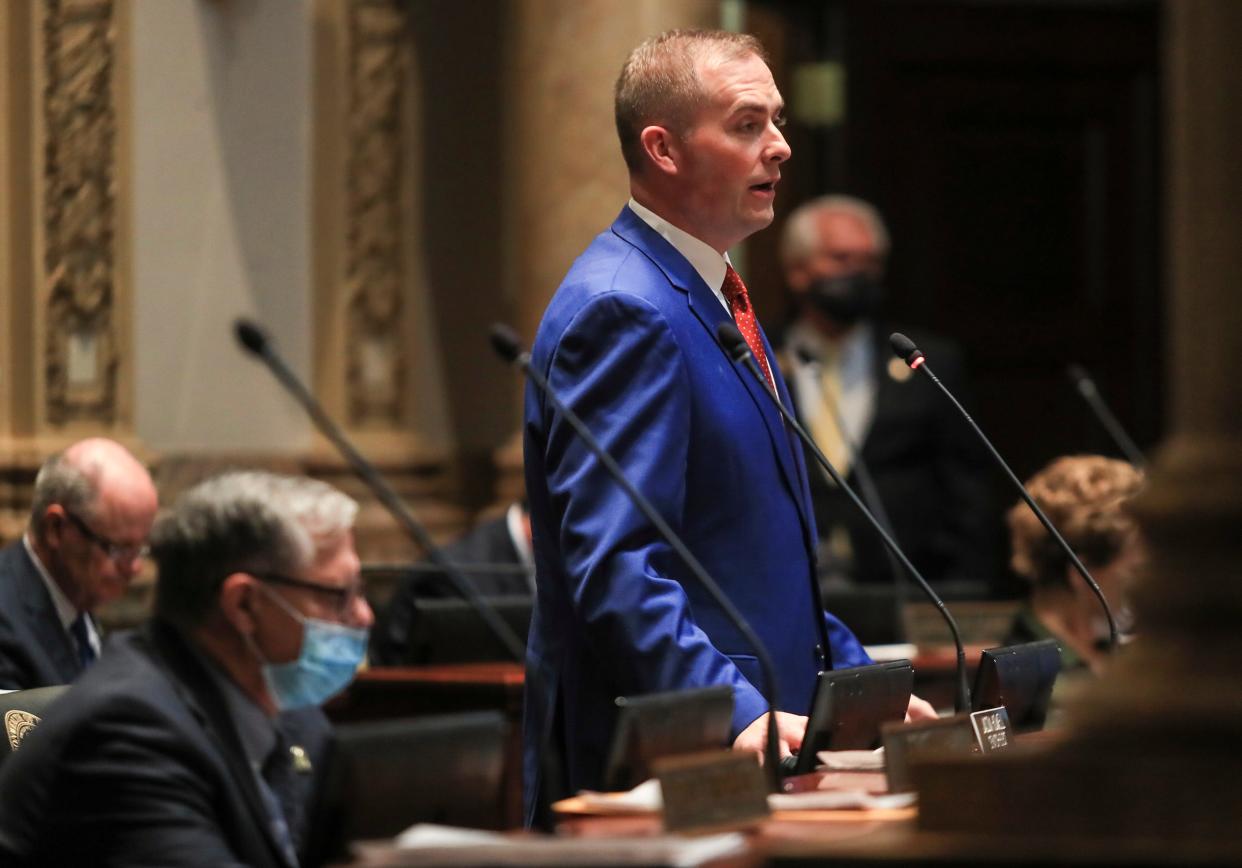Senate advances bill to shield nonprofit donors, over Kentucky Press Association concerns

- Oops!Something went wrong.Please try again later.
FRANKFORT, Ky. — The state Senate passed a bill Wednesday intended to protect the privacy of donors to nonprofit organizations, though the Kentucky Press Association says it could jeopardize the First Amendment rights it seeks to protect.
Senate Bill 62, sponsored by Sen. Whitney Westerfield, R-Crofton, is intended to codify a U.S. Supreme Court ruling striking down a California law that compelled major donors to nonprofits to be disclosed to the state attorney general.
While no such bill to do so is currently advancing in Kentucky, Westerfield told a committee last week it would protect donors by prohibiting similar actions of a public agency to disclose such donors "out of an abundance of caution."
The "personal information" protected in the bill would include "any list, record, registry, roll, roster, or other compilation of data of any kind that directly or indirectly identifies a person as a member, supporter, volunteer, or donor of financial or nonfinancial support to any nonprofit organization."
More:These key bills haven't been filed in Kentucky's legislature as deadlines loom
The bill cleared a Senate committee with a unanimous vote last week, but the Kentucky Press Association issued a statement Tuesday saying SB 62 infringes on other First Amendment rights of the public and press and "exposes records custodians to frivolous lawsuits and serious financial liability."
The statement from KPA attorneys Jon Fleischaker and Michael Abate says SB 62 "extends far beyond" the Supreme Court ruling on the California law, restricting the right of the public and press to access what is deemed to be personal information of donors in court proceedings, with courts prohibited from allowing such information into the public record without first finding "good cause."
Under SB 62, the KPA attorneys said courts "must default to sealing and redacting 'personal information' from the court record and closing otherwise public trials to the press and public if 'personal information' is presented."
The KPA also says SB 62 imposes "substantial civil and criminal liabilities" on government officials who release such information, including a fine of at least $2,500 for those who inadvertently release information protected in the bill and a potential Class B misdemeanor with a 90-day jail sentence for those who knowingly release such information.
Those "draconian" penalties "are much more likely to flood Kentucky’s courts with frivolous lawsuits designed to cash-in on an unwitting civil servant’s incidental disclosure of benign information and chill the production of nonexempt information in response to valid open records requests," Abate and Fleischaker said.
More:New, sweeping anti-trans bill being fast-tracked in Kentucky legislature
The KPA added that it would not oppose a statute that codifies the Supreme Court's narrow ruling, while striking sections involving the judicial branch, civil and criminal penalties on individuals, and the option for a person to request anonymity from a nonprofit organization that is affiliated with a public agency.
That latter point was also raised by Amye Bensenhaver of the Kentucky Open Government Coalition, who wrote SB 62 would undermine a 2008 Kentucky Supreme Court ruling that the public had a right to information on donors to the University of Louisville Foundation, since it is a nonprofit affiliated with a public agency.
Besides asserting the new exception for personal information under the Kentucky Open Records Act is too broad, Bensenhaver wrote that SB 62 would return state law on such disclosure to its pre-2008 status, "compromising the public's ability to hold nonprofit organizations affiliated with a public agency ... accountable."
Asked to respond to the criticisms, Westerfield told The Courier Journal he spoke with the KPA prior to the committee meeting about its concerns, "and I appreciate their input."
"I believe the privacy of Kentucky nonprofit donors should be private and safe, consistent with the Bonta decision, in a manner that protects Kentuckians’ First Amendment rights," Westerfield said.
The Senate passed SB 62 by a 31-3 vote Wednesday with minimal discussion.
Reach reporter Joe Sonka at jsonka@courierjournal.com and follow him on Twitter at @joesonka.
This article originally appeared on Louisville Courier Journal: Senate advances bill to shield nonprofit donors, over KPA concerns

